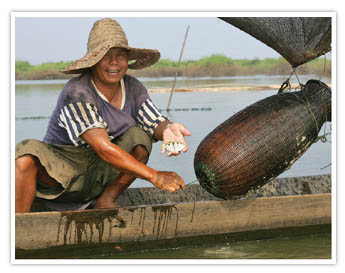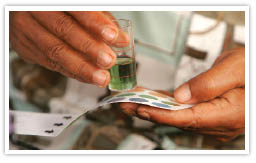Progress Report 2006
Fisheries Programme
The Lower Mekong fishery supports up to 40 million people and two-thirds of the population of the Lower Mekong Basin are actively involved at least part-time in the fisheries. Therefore it is necessary to manage the productive Mekong fisheries so as to sustain their high yield and economic output into the future. This is why the development objective of the Fisheries Programme is: ”Coordinated and sustainable development, utilisation, management and conservation of the fisheries of the Mekong Basin“.

The programme has four components:
- Fisheries ecology, valuation and mitigation;
- Fisheries management and governance;
- Aquaculture of indigenous Mekong fish species.
- Programme management and communication;
The Fisheries Programme Phase 2 started in January 2006, directly after completion of Phase 1. Phase 2 is building on the achievements of the first phase of the Programme, specifically in the areas of fisheries ecology; valuation of fisheries in the LMB; mitigation of the impacts of developments; fisheries management and governance; aquaculture of indigenous species; and communication of information to governments and planning agencies.
The programme operates within one shared system of support functions and infrastructure. Activities and staff are maintained in each of the riparian countries, and are building an excellent network with line agencies and institutes. This presence includes a national programme director and the support required for programme activities in the country. Virtually all field-based activities of the programme are conducted through fisheries Line Agencies, however national consultants are also used when necessary for particular activities.
In 2006 the Fisheries Programme achieved five main outputs according to its plan.
Raising the awareness of fisheries
The Fisheries Programme produced many publications over the course of 2006. these include technical papers in the MRC’s Technical Series and the Technical Advisory Body’s Management Recommendation Series; the regular newsletter Catch and Culture (in English and riparian languages); and a film produced by the Vietnamese Research Institute No 2 on the fisheries of the Mekong delta (similar films for Lao PDR and Thailand are currently being finalised). In addition, translation and publication of Technical and Development Series publications in riparian languages continued. One of these is the Khmer version of the book on “Fishing Gears on the Cambodian Mekong”, which was highly appreciated by parliamentarians during debates on the new fisheries law in Cambodia.
The Fisheries Programme continued to provide input into several regional planning initiatives, such as the Integrated Basin Flow Management studies being organised by the Environment Programme and the Water Utilisation Programme and, and a range of activities coordinated by the Mekong Wetlands Biodiversity Programme.
Development of Human and institutional capacity
The Technical Advisory Body on Fisheries Management (TAB) continued the implementation of its 2004-2006 work plan. Organisationally the TAB is now well established, being supported in its work by a functioning secretariat with presence at both the regional and national levels. The major activity for the TAB in 2006 was the implementation of a series of three-day learning events on regional fisheries management conducted in Member Countries. The learning events targeted mid-level provincial fisheries managers, and were conducted in the national languages.
The TAB also undertook a field study in Myanmar, investigating the very impressive inland fisheries and the relevance of management initiatives for the Mekong. The TAB is now looking to extend the activity in its next three-year work programme. A series of research training activities (on fisheries ecology, economics and management) was completed in March at the Inland Fisheries Research and Development Institute in Cambodia. These activities provided specialised training at all stages of project design and implementation as well as in institutional management of the projects. Further on-the-job training was completed particularly within the Fisheries Management and Governance and Aquaculture of Mekong Indigenous Fish Species components.
Formulation and implementation of Mekong basin fisheries development strategies

Several fisheries development strategies, at country level and for particular fisheries, were elaborated within various activities of the Fisheries Programme. National partners will build on these activities to determine whether a regional strategy will complement the national strategies, or whether the necessary components are already covered at national levels.
The Fisheries Programme worked with a consortium of partners in developing conservation strategies for the giant Mekong catfish. This included technical work in developing models which might assist in indicating the conservation status of the species, as well as the more practical aspects of implementing a moratorium on fishing for the species in the Mekong in northern Thailand and Lao PDR.
Monitoring of several fisheries continued, with the aim of getting hard data on trends in fisheries in the Basin. Breeding of several indigenous species was achieved for the first time, directly supporting national initiatives in promotion of indigenous species for aquaculture.
Scoping and promotion of Mekong development projects
The Fisheries Programme assisted fisheries consultants to develop a project on fish passage (facilities enabling fish to pass upstream and downstream of barriers) in Lao PDR. While the project will be based in Lao PDR, the programme is ensuring the project has broader regional applicability, and that fisheries technicians in other countries will have observer status during the course of the project. The project is likely to start in 2007 and will probably run for 2-3 years.
A project also is also being planned to review and analyse the data from three fisheries that have been monitored in the Mekong for approximately 10 years. An initial scoping study was conducted in May-June, under funds supplied by the Australian Centre for International Agricultural Research (ACIAR). The report was very favourable, and is now being reviewed by ACIAR to determine follow-up action.
Facilitation of implementation of fisheries development activities
The Fisheries Management and Governance component continued to provide a platform for the development of comanagement activities in all MRC-Member States. Of special significance here is the integrated water resource management project taking place at Soc Trang, in Viet Nam, where shrimp farmers and rice farmers are working together to develop sustainable practices for water use by both parties, improving on-farm profitability and environmental management in the area.
The Fisheries Programme continues to be supported by the Governments of Denmark, Sweden and Australia
Choose a newsletter: